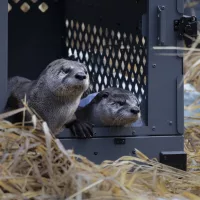
When people conjure up the image of a poacher, it’s usually a shady character shooting a trophy buck or bull out of season or without a tag for the thrill of the kill, the antlers or the meat. But other wildlife that aren’t hunted are also poached.
A new coalition aims to fight that. Eight non-profit groups joined statewide efforts to combat poaching by creating a new cash reward program for tipsters who call the OSP Turn In Poachers (TIP) Line—this time benefiting these “non-game” species that aren’t hunted.
The Oregon Wildlife Coalition (OWC) will pay rewards of $500-$1,000 for poaching reports that lead OSP F&W Troopers to an arrest or citation. OWC launched the new reward program to address poaching of non-game species.
“Oregon has a pervasive poaching problem, and we want to be part of the solution,” said Danielle Moser, a representative of the Oregon Wildlife Coalition. “When poachers kill wildlife, they steal from all Oregonians who value and enjoy our state’s wildlife and the wild places they call home. Our goal is to incentivize members of the public to report any suspicious or illegal wildlife activity to the Oregon State Police.”
The OWC reward fund will offer cash incentives for members of the public who report poaching of both game and non-game species. In addition to game species like deer, elk and bear, the new reward fund will cover species like raptors, small mammals, and reptiles.
For instance, OWC will pay $500 as a reward for poaching tips on eagles, hawks, owls and other raptors. Or they will pay $1,000 for poaching tips on animals listed as “Threatened” or “Endangered” through either the state or federal Endangered Species Act—wildlife like wolverines, kit foxes, red tree voles, and sea otters.
Imperiled species also include those routed into wildlife trafficking systems through the pet trade, wet markets and illegal online sales. For instance, pond dwellers, like frogs, turtles, reptiles and other small animals are easy to catch and keep or sell. Such capture can devastate the balance of micro-ecosystems.
The new fund is similar to an existing program managed by Oregon Hunters Association (OHA), which offers cash rewards for tips that lead to an arrest or citation for poachers who target game species. OHA rewards cover reports of game animals like elk, deer and waterfowl, for which there are regular hunting seasons. In 2020, OHA distributed more than $20,000 in cash rewards.
The hope is that poachers will think twice before going after non-game animals like hawks, owls and eagles for the thrill of the kill, according to ODFW Stop Poaching campaign manager, Yvonne Shaw.
“Raptors, which eat incredible numbers of mice, voles and other crop pests, have been targeted,” she said. “We lose many incredible birds every year from thrill-killers.”
ODFW will continue to offer hunter preference points as a reward to tipsters if they prefer that over the cash rewards offered by OWC and OHA. More information can be found on the OSP Fish and Wildlife Division website.
The Stop Poaching Campaign educates the public on how to recognize and report poaching. This campaign is a collaboration among state agencies, sportsmen and other conservationists, landowners, and recreationists to engage the public in combatting Oregon’s poaching problem. Our goal is to: Incentivize reporting on wildlife crimes through the TIP Line; Strengthen enforcement by increasing the number of OSP Fish and Wildlife Troopers; and Support prosecution in becoming an effective deterrent. The campaign helps to protect and enhance Oregon’s fish and wildlife and their habitat for the enjoyment of present and future generations. Contact campaign coordinator Yvonne Shaw for more information. Yvonne.L.Shaw@odfw.oregon.gov.
If you know of or suspect other crimes against fish wildlife or habitat, please report to the Turn In Poachers (TIP) Line. 1-800-452-7888 or *OSP (*677) from a mobile phone. Or email: TIP@osp.oregon.gov between the hours of 8-5 Mon-Fri.















